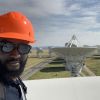
Dr Mubela Mutale
- Position: Research Fellow
- Areas of expertise: high-mass star formation; hii regions; massive young stellar objects; radio observations/ data reduction; surveys
- Email: M.Mutale@leeds.ac.uk
- Location: 4.10 Sir William Henry Bragg Building
- Website: ORCID
Research interests
My research is focused on observing the Milky Way in search of compact objects with radio surveys. Thus, I spend a great deal of time developing pipelines for the reduction and analysis of radio interferometry data. I have led and/or worked on large area radio surveys such as KuGARS, SMGPS, and CORNISH-south, observed with the Very Large Array, MeerKAT, ATCA, and e-Merlin and my expertise in radio astronomy includes observing on the Australia Telescope Compact Array.
My science interests are primarily focused on the birth of high-mass stars – those with masses greater than eight times the mass of our sun. Massive stars play an extemely important role in controlling the properties of the Universe. They inject large amounts of energy and momentum into interstellar gas, directly affect subsequent star formation rates, and have a huge impact on the chemical composition within a galaxy. However, many details of the early lives of massive stars are still not well understood. The process of massive star formation takes place within dense dark clouds, and these stars begin shining through hydrogen fusion while still accreting surrounding material. These two constraints make the star-formation process hard to observe. Therefore, to understand massive stars, we need to understand the environments in which they are born. Massive stars significantly affect their immediate environments, creating hot gas bubbles called HII regions. Consequently, young hot bubbles are among the most efficient tracers of recent massive star formation and give us a unique opportunity to gain new perspective on the birth of massive stars. Particularly, compact, and hypercompact hot bubbles, being the smallest and presumably the youngest such systems, can provide the best probe on the earliest interactions of the nascent star with its environment.
Qualifications
- PhD Astrophysics (University of Hertfordshire)
- MSc Astrophysics (University of Hertfordshire)
Professional memberships
- Royal Astronomical Society
Student education
I co-supervise PhD, Mphys, and MSc projects on massive star formation and radio interferometry

